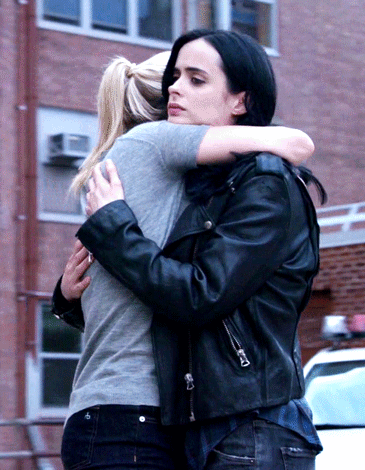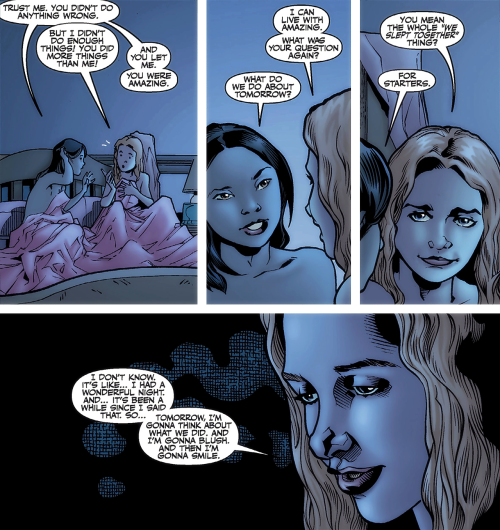Yesterday, we learned that, in a recent interview, Melissa Rosenberg won’t be letting Jessica Jones off the hook that easily on the second season of her eponymous show. Kilgrave may be gone, but Jessica will still be dealing with the effects of her trauma for some time to come—just like in real life. However, Rosenberg also discussed another aspect of the show—the female friendship at its center—and discussed different possible approaches to it that I have very mixed feelings about.
In an interview with Esquire, Rosenberg comments on the fact that many people, including one of the actresses in question, thought that Jessica and her BFF Trish had either been romantically involved at some point, or wanted to be:
With Kilgrave gone and Luke Cage busy with his own show, Season Two’s supporting cast will look very different, and Jessica’s relationship with adopted sister Trish (Rachael Taylor) will be even more firmly at the core. Theirs is a dynamic so charged with history and intimacy that some viewers–including Ritter herself at the audition stage–mistook them for ex-lovers before their backstory was revealed.
“People would love that,” Rosenberg noted, not un-wearily. “I sometimes think there’s sort of a prurient interest in that, like, can’t women just be friends? I feel like for me that’s what is unique about the relationship, that they are such intimate friends, and I think they don’t have to become lovers—that being said, one never knows.”

I’m not sure how I feel about this. On the one hand … yay LGBTQIA representation! There’s no question that we need more of that on television. The problem for me arises when it’s shoehorned into a show where it doesn’t necessarily belong while simultaneously removing things that are just as deserving of being authentically represented in media.
I don’t disagree with Rosenberg that “there’s sort of a prurient interest in that.” How much of the interest in Jessica and Trish being a couple is a genuine desire for representation, and how much of it is people wanting to bring their fan fiction to life and watch two women kiss at the expense of a different type of very important relationship? Why can’t women just be really good friends, indeed? Does every single couple that care for each other deeply need to be shipped? Do Sherlock and Watson need to develop sexual feelings for each other? Is romantic love the only kind of love that’s valid on television?
And why is it that, no matter what—whether it’s with each other, or with men—people feel the need to reduce female characters to the people with whom they’re having sex? While I’m sure there’ll be a love interest eventually on Luke Cage, I’m equally sure that he’ll be allowed to brood on his own for a really long time. Matt Murdock on Daredevil was, despite a brief kiss with Claire, completely unattached until season two.
Meanwhile, we’ve never seen Jessica either not having sex with or not being desired by someone on her own show. With Luke Cage on her left, and the abusive Kilgrave on her right, she was a sexual object for much of her first season. Not that she was objectified by Luke Cage (they are actually a match, especially considering their comic book history, and she totally pursued him), but that Jessica as a sexual being was, at least in part, presented as a sexual object for fans to enjoy. Look how hot it is to watch this Cool Girl have all this sex. Perhaps not entirely consciously, but because that’s what too often inevitably happens with women on TV shows.
In Jessica’s case, however, because of the trauma she’d been through at the hands of Kilgrave, there was at least a character-based reason why she might choose to assert herself sexually in the way that she has, and I understand that, too. Wanting to own your own experiences rather than have them dictated by your abuser. However, one of the big highlights of Jessica Jones Season One were the scenes between Jessica and Trish precisely because they weren’t sexual in nature. We got to see Jessica breathe in those scenes. She was safe, at ease, and understood with Trish. Even when Trish was coming down on Jessica for the way she lived her life, even when they fought, there was undeniably love there.
And just because it’s deep, doesn’t mean it has to be sexual or romantic.

When thinking about this, I was reminded of the Buffy Season 8 comics, in which Buffy randomly engages in a brief sexual relationship with fellow Slayer, Satsu. While it’s clear that Satsu had been crushing on Buffy for a while, Buffy had never once expressed any attraction to a girl before. What’s more, after they sleep together, she breaks things off with Satsu because she’s straight and acknowledges that the only reason this happened is because she’s been lonely and hasn’t had “a wonderful night” in a while. It was all very weird and out-of-left-field. And after it ends, she never expresses feelings for a woman again.
Whereas Willow’s sexuality was explored in an organic way over time, the Buffy/Satsu pairing in the Buffy comics seemed a clear example of wanting to show girls kissing each other for momentary shock value and reader titillation. Not that experimentation like that doesn’t happen in real life…but why did Buffy need to do it? What was the point? What was gained?
To me, it matters more to create nuanced LGBTQIA characters from the outset, and then nurture and explore them. On Jessica Jones (and subsequently on Daredevil), I feel like that has started happening with Jeri Hogarth (played by Carrie-Anne Moss). Despite the fact that she was originally a male character in the comics, she’s a better example of how to do a complex LGBTQIA character for television. They don’t have to be perfect, but they do have to be people who are nuanced and evolve. As the first lesbian character of the Marvel Cinematic Universe, there’s a huge opportunity with Jeri that I hope Jessica Jones and the rest of the Marvel shows take advantage of.
Meanwhile, suddenly “discovering” that Jessica and Trish’s relationship was romantic or sexual in nature would feel really cheap. Thankfully, Rosenberg doesn’t seem too keen on the idea either, though her tacked on “one never knows” comment concerns me (no queer-baiting, please!). I hope she finds new ways to explore their friendship that don’t involve them making out. I’m not saying one or both of them couldn’t be bisexual. I’m saying they don’t have to feel that way about each other.
They grew up together. They’re basically sisters. And while that hasn’t stopped Barry Allen and Iris West from getting together on The Flash, there’s something so much more important about seeing two women have this level of intimate friendship. We need to remember that we can rely on each other in this way.
Female friendship is about so much more than going shoe shopping together, or complaining about the men in our lives. With Jessica and Trish, women of all sexual orientations get to see a great example of a quality, deep female friendship on television that is treated as though it has value. Because it does.
(via Comic Alliance)
Want more stories like this? Become a subscriber and support the site!
—The Mary Sue has a strict comment policy that forbids, but is not limited to, personal insults toward anyone, hate speech, and trolling.—
Follow The Mary Sue on Twitter, Facebook, Tumblr, Pinterest, & Google+.








Published: Sep 22, 2016 12:57 pm